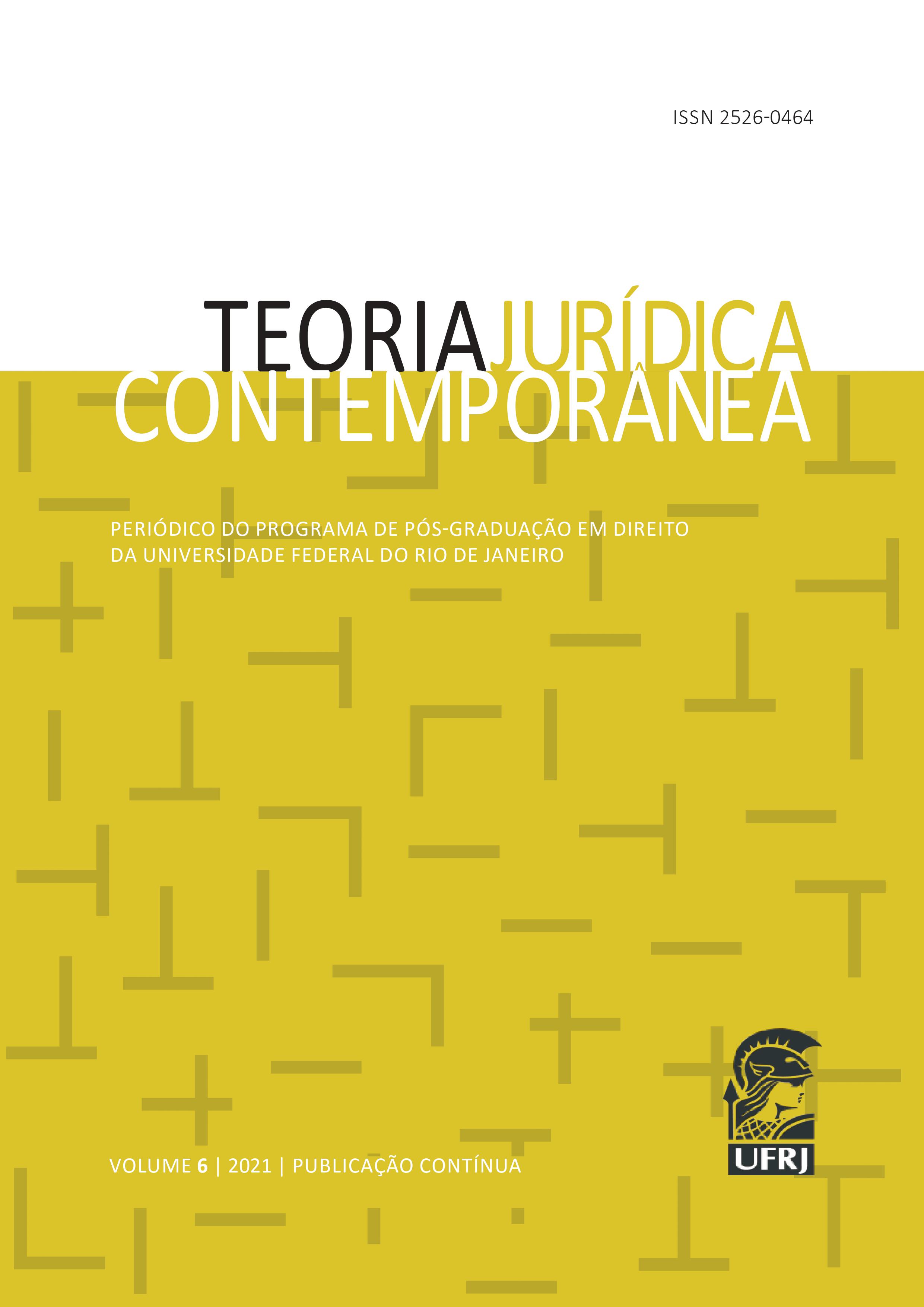REGRAS, PRA QUE TE QUERO? A RELEVÂNCIA DO DIREITO NA REGULAÇÃO DE NOVAS TECNOLOGIAS
DOI:
https://doi.org/10.21875/tjc.v6i0.44759Keywords:
Autorregulação, Formalismo, Tecnorregulação, Meta-tecnologiaAbstract
O objetivo do presente artigo é analisar qual destas opções é a melhor em se tratando da regulação de novas tecnologias: se o banimento total, a autorregulação ou a tecnorregulação. A hipótese levantada é que a regulação jurídica é necessária, constituindo a maneira adequada de se regular novas tecnologias de modo que coexistam a possibilidade de desenvolvimento tecnológico e a salvaguarda de direitos fundamentais. Discutimos as contribuições do formalismo jurídico para a regulação das inovações tecnológicas, explorando os conceitos de legal regulation by design e direito como meta-tecnologia. Concluímos que, embora não seja suficiente per se, uma perspectiva meta-tecnológica do direito é fundamental para uma regulação efetiva das novas tecnologias.Downloads
References
ALEXANDER, Larry; SHERWIN, Emily. The rule of rules: morality, rules, and the dilemmas of law. Durham: Duke University Press, 2001.
FLORIDI, Luciano. Energy, risks, and metatechnology. Philosophy and Technology, v. 24, n. 2, p. 89-94, 2011.
FLORIDI, Luciano. The fourth revolution: how the infosphere is reshaping human reality. Oxford University Press, 2014.
FRAZÃO, Ana. Fundamentos da proteção de dados pessoais. Noções introdutórias para a compreensão da importância da Lei Geral de Proteção de Dados. In: TEPEDINO, Gustavo; FRAZÃO, Ana; OLIVA, Milena D. (coord.). Lei Geral de Proteção de Dados Pessoais e suas repercussões no Direito Brasileiro. 1.ed. São Paulo: Thomson Reuters Brasil, 2019. p. 23-52.
FREY, C. B. The technology trap: capital, labor, and power in the age of automation. Princeton, New Jersey: Princeton University Press, 2019.
HILDEBRANDT, Mireille. Legal Protection by Design: Objections and Refutations. Legisprudence, v. 5, n. 2, p. 223–248, out. 2011.
HILDEBRANDT, Mireille. Smart technologies and the end(s) of law: novel entanglements of law and technology. Cheltenham, UK: Edward Elgar Publishing, 2015.
HILDEBRANDT, Mireille; TIELEMANS, Laura. Data protection by design and technology neutral law. Computer Law & Security Review, v. 29, n. 5, p. 509–521, 2013.
HILDEBRANDT, Mireille; VRIES, Katja de (Orgs.). Privacy, due process and the computational turn: the philosophy of law meets the philosophy of technology.
Abingdon, Oxon, [England] ; New York: Routledge, 2013.
LEENES, Ronald. Framing Techno-Regulation: An Exploration of State and Non-State Regulation by Technology. Legisprudence, v. 5, n. 2, p. 143–169, 2011.
LESSIG, Lawrence. Code: and other laws of cyberspace. New York: Basic Books, 1999.
LESSIG, Lawrence. Code is Law: on liberty in cyberspace. Harvard Magazine, 2000. Disponível em: http://harvardmagazine.com/2000/01/code-is-law-html. Acesso em: 15 jan. 2020.
LESSIG, Lawrence. Free culture: The nature and future of creativity. New York:
Penguin, 2004.
LESSIG, Lawrence. Code: version 2.0. New York: Basic Books, 2006.
O’NEIL, Cathy. Weapons of math destruction: how big data increases inequality and threatens democracy. First edition ed. New York: Crown, 2016.
PAGALLO, Ugo. The laws of robots: crimes, contracts, and torts. Dordrecht, Heidelberg, New York, London: Springer, 2013.
PAGALLO, Ugo et al. New technologies and law: global insights on the legal impacts of
technology, law as meta-technology and techno regulation. 2015. Disponível em:
https://www.lawschoolsgloballeague.com/wp-content/uploads/2017/01/New-Technologies-
and-Law-Research-Group-Paper-2015.pdf. Acesso em: 21 jun. 2021.
PAGALLO, Ugo. The legal challenges of Big Data: putting secondary rules first in the field of EU Data Protection. European Data Protection Law Review, v. 3, n. 1, p. 36-46, 2017.
PAGALLO, Ugo; DURANTE, Massimo. The philosophy of law in an information society. In: FLORIDI, Luciano (ed.). The Routledge handbook of philosophy of information. London, New York: Routledge, 2016, p. 396-407.
PASQUALE, Frank. The Black box society: the secret algorithms that control money and information. Cambridge: Harvard University Press, 2015.
SCHAUER, Frederick. Formalism. Yale Law Journal, v. 97, n. 4, 1988. Disponível em: https://digitalcommons.law.yale.edu/ylj/vol97/iss4/1. Acesso em: 13 jan. 2021.
SCHAUER, Frederick. Imposing Rules. San Diego Law Review, v. 42, n. 1, p. 85, 2005.
SCHAUER, Frederick F. Playing by the rules: a philosophical examination of rule-based decision-making in law and in life. Repr. Oxford: Clarendon Press, 2002. (Clarendon law series).
SCHAUER, Frederick F. The force of law. Cambridge, Mass.: Harvard Univ. Press, 2015.
STRUCHINER, Noel. Formalismo Jurídico. In: Vicente de Paulo Barretto. (Org.). Dicionário de Filosofia do Direito. Rio de Janeiro: Renovar/ Unisinos, 2006, p. 363-366.
STRUCHINER, Noel. O “aparente” paradoxo das regras. ethic@ - An international Journal for Moral Philosophy, v. 8, n. 3, p. 63–71, 2009.
WARREN, Samuel D.; BRANDEIS, Louis D. The Right to Privacy. Harvard Law Review, v. 4, n. 5, p. 193–220, 1890.
ZUBOFF, Shoshana. The age of surveillance capitalism: the fight for a human future at the new frontier of power. First edition ed. New York: PublicAffairs, 2019.
Downloads
Published
Issue
Section
License
The authors who publish in this journal agree with the following terms:
1. The authors maintain the copyright and grant the journal the right of first publication, with the work simultaneously licensed under the Creative Commons Attribution License that allows the sharing of the work with recognition of authorship and initial publication in this journal.
2. Authors are allowed to assume additional contracts separately, for non-exclusive distribution of the version of the work published in this journal (e.g., publishing in an institutional repository or as a book chapter), with acknowledgment of authorship and initial publication in this journal.
3. Authors are allowed and encouraged to publish and distribute their work online (e.g., in institutional repositories or as a personal page) at any point before or during the editorial process, as this may generate productive changes, as well as increase the impact and citation of the published work (See The Effect of Open Access).

This work is licensed under a Creative Commons Attribution-ShareAlike 3.0 Brazil License.

